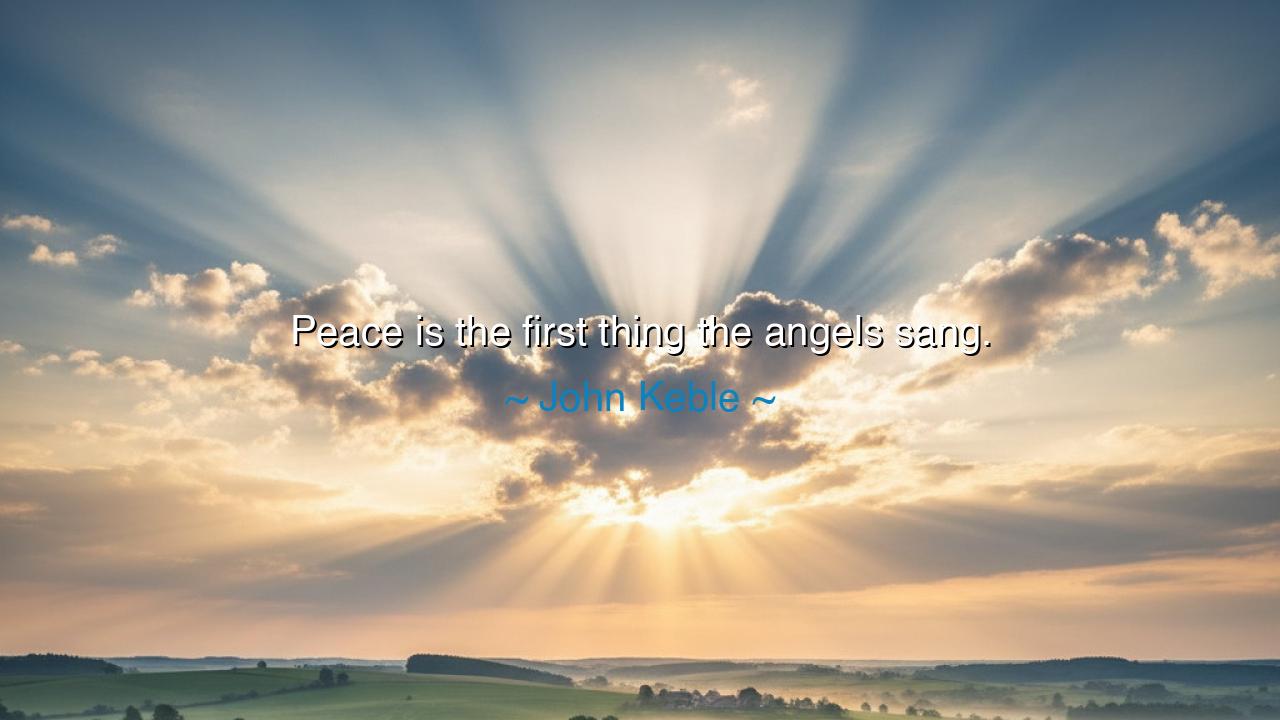
Peace is the first thing the angels sang.






“Peace is the first thing the angels sang.” Thus wrote John Keble, the English poet and priest, whose words echo back to the ancient fields of Bethlehem, where shepherds watched their flocks by night and heaven broke into song. His quote is not a mere ornament of speech, but a remembrance of that sacred night in Christian tradition when angels proclaimed, “Glory to God in the highest, and on earth peace, goodwill toward men.” From the very beginning of the Gospel’s good news, peace was lifted as the first gift, the first proclamation, the first song of eternity offered to humanity.
When Keble places peace at the center, he reveals the heart of divine intention. Not power, not conquest, not wealth—but peace. For in the ordering of heaven’s message, what is named first carries the highest weight. If angels, the messengers of eternity, chose peace as their opening song, it is because peace is the foundation upon which all other blessings must rest. Without peace, love is strained, joy is fractured, and justice falters. But where peace reigns, all things flourish.
This truth is not confined to scripture but resounds across history. Consider the reign of Emperor Ashoka of India, who once drenched the land in blood through conquest but, upon awakening to the horror of his deeds, laid down the sword and proclaimed the rule of peace through the teachings of the Buddha. His people remembered his reign not for his victories in war, but for the harmony he nurtured afterward. Like the angels of Bethlehem, his greatest song was peace, and his legacy endures because of it.
And yet, Keble’s words also carry a rebuke to mankind. For though the angels sang of peace, humanity too often chooses strife. Nations sing hymns of power, men raise banners of division, families nurse grudges, and hearts harbor resentment. We have exchanged the angelic song for the drumbeat of war and the whisper of bitterness. Keble reminds us that we were called first to peace, and every departure from it is a departure from heaven’s design.
But peace is not weakness. True peace is not the silence of oppression nor the submission of the powerless. It is the strength to forgive, the courage to reconcile, the wisdom to resolve conflict without destroying the other. The angels sang peace not because the world was already calm, but because the world was broken and needed healing. So too must we learn to sing peace into the noise of conflict, to speak calm into the storm, to embody in our lives the song of heaven.
The lesson for us is this: let peace be the first thing in our own lives. Before ambition, before pride, before argument, let us choose peace. When wronged, resist resentment. When tempted to quarrel, seek understanding. When surrounded by noise, create silence. For just as the angels proclaimed it first, so must we place it first if our lives are to echo the harmony of heaven.
Practical actions flow naturally: in the family, speak words that heal, not words that wound. Among friends, be the one who reconciles, not the one who divides. In your work, labor not only for success, but for harmony among people. And in your soul, cultivate stillness through prayer, meditation, or reflection, so that your inner life sings the same peace the angels proclaimed.
Thus let Keble’s words endure: “Peace is the first thing the angels sang.” If heaven began its song with peace, should not we also? Let peace be your first word in conflict, your first step in struggle, your first desire in life. For in peace lies the seed of every blessing, the foundation of all harmony, and the echo of the eternal song that has never ceased.






AAdministratorAdministrator
Welcome, honored guests. Please leave a comment, we will respond soon